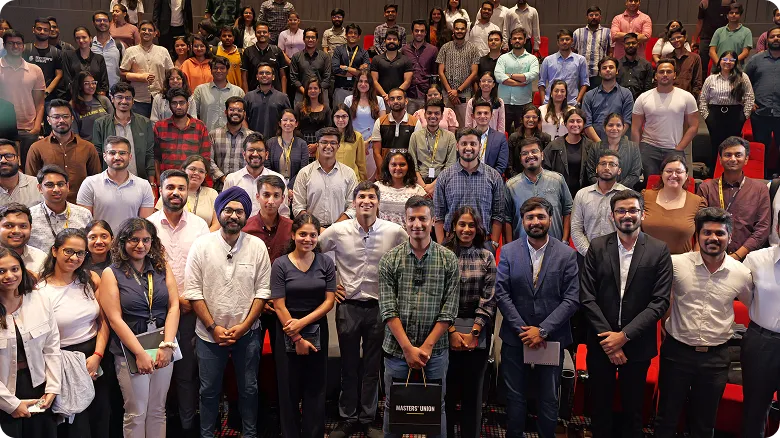Undergraduate
Undergraduate (Global)
Postgraduate
PGP in Technology and Business Management
PGP in Technology & Business Management
(Young Leaders Cohort)
PGP in Human Resources & Organisation Strategy
PGP in Sports Management & Gaming
PGP in Applied AI & Agentic Systems
PGP in UI/UX & Product Design
PGP in Sustainability & Business Management
PGP Bharat
Executive
Family Business
Careers
Innovations
Faculty
MU Ventures
Enterprise Education
Student Life
Jobs
Become a Master
events
For Companies
Blog
Business
Entrepreneurial Lessons from Ashneer Grover: Learn from Real Founders
January 23, 2025

Success today is determined less by traditional markers like degrees and job titles, and more by adaptability, resilience, and the ability to create impact. Among the leaders who embody this philosophy is Ashneer Grover, whose story continues to inspire countless aspiring professionals. His insights on education, business, and entrepreneurship redefine conventional norms, offering a blueprint for students and young leaders who wish to chart their own paths.
The Ashneer Grover story is not about smooth victories but about turning challenges into opportunities. From rethinking the role of formal education to embracing failure and valuing time, his journey reflects the practical wisdom every business student should take seriously.
Learn the critical lessons from Ashneer Grover’s education, business, and entrepreneurial experiences that remain relevant for aspiring leaders at Masters’ Union.
Education & Upskilling is A Lifelong Commitment
When reflecting on Ashneer Grover education, one realizes that learning does not stop with college or professional courses. He emphasizes that while academic knowledge provides a foundation, real-world exposure truly shapes one’s capabilities. Classroom theories gain meaning only when applied in practical scenarios such as internships, side projects, or independent problem-solving.
This approach challenges the rigid framework where success is defined only by degrees. Instead, Grover insists on lifelong learning, a mindset where individuals actively seek skills from experiences, online courses, and continuous experimentation.
For business students, the lesson is clear: adaptability matters more than static credentials. The industries of tomorrow will reward those who can learn and unlearn quickly, blending structured knowledge with hands-on wisdom
-
Academic qualifications are the starting point, not the destination
-
Practical exposure sharpens decision-making and innovation
-
Continuous learning is critical in a dynamic business world
Entrepreneurship: Redefining Failure as Progress
The Ashneer Grover story stands out because of his willingness to embrace failures as milestones. His entrepreneurial career is proof that setbacks are not permanent roadblocks but stepping stones to resilience.
Instead of fearing failure, Grover highlights how it provides clarity, teaches humility, and inspires better strategies. In a world that glorifies quick success, he reminds us that entrepreneurship is a long-term game built on persistence, creativity, and calculated risk-taking.
For students dreaming of Ashneer Grover business-like ventures, the key lies in embracing uncertainty, experimenting with ideas, and using failures as feedback rather than final verdicts.
Stepping Stones for Future Entrepreneurs
-
Failures refine strategies and develop resilience
-
Risk-taking is essential for innovation
-
Persistence fuels sustainable entrepreneurship
Time Management: The Most Valuable Asset
Ashneer Grover underscores that time is a finite resource that must be treated with utmost discipline. He stresses aligning daily activities with long-term objectives rather than being consumed by minor distractions.
This advice is particularly relevant for business students managing coursework, internships, and networking. Strategic use of time not only increases productivity but also builds the foundation for professional excellence. Grover suggests focusing on what moves the needle forward, whether in personal growth or business ventures.
Effort is the Only Key to Progress
-
Prioritize tasks that align with future goals
-
Eliminate distractions that drain focus
-
Strategic time allocation leads to long-term growth
Financial Literacy: The Cornerstone of Independence
A significant lesson from Ashneer Grover business experiences is the importance of financial awareness. Understanding money management is not just about running companies, it’s a fundamental skill for every individual aiming for independence.
Grover encourages mastering the basics of budgeting, saving, and investing. For entrepreneurs, financial literacy becomes even more critical, as it directly impacts funding, cash flow, and sustainability.
For students, starting early with personal finance management can prevent future mistakes and build confidence in handling larger business responsibilities.
Start Small for Big Impacts:
-
Strong financial habits lead to independence and stability
-
Entrepreneurs must understand cash flow, investments, and risk
-
Financial awareness enhances decision-making power
Legal Awareness: Safeguarding Business Interests
One of the overlooked aspects of building ventures, according to Grover, is legal understanding. Contracts, intellectual property, and employment laws are often neglected until they cause challenges.
Grover highlights from his own experiences that a basic grasp of legal frameworks is necessary to protect both business ideas and operations. For students entering the business world, legal awareness offers security and avoids costly mistakes.
Learning Basics of Everything like Legal
-
Legal literacy is crucial for sustainable entrepreneurship
-
Protecting intellectual property safeguards innovation
-
Awareness of contracts and compliance prevents disputes
Networking: The Strength of Relationships
In every successful Ashneer Grover business initiative, networking played a vital role. He emphasizes that success is rarely a solo journey. Mentors, peers, and collaborators shape opportunities and provide guidance that can accelerate growth.
For students, this translates to active engagement in professional circles. Attending events, connecting with alumni, and building mentor relationships are investments that yield long-term benefits.
Networking with Meaningful Circles
-
Strong networks unlock opportunities and resources
-
Mentorship accelerates learning and decision-making
-
Building relationships early pays off in career progression
End Thoughts
The Ashneer Grover story is not a narrative of privilege or a straight path—it’s a reminder that resilience, adaptability, and boldness create lasting success. His lessons inspire students to avoid blindly following conventional paths and instead focus on building careers shaped by curiosity, self-education, and risk-taking.
The broader takeaway for business students is to embrace education beyond textbooks, prioritize financial literacy, develop time discipline, and recognize the role of both legal knowledge and networking. By approaching life with an entrepreneurial mindset, students can design futures that reflect their unique strengths and aspirations.
An Innovative Mindset Takes You Long Way
-
Success does not follow a single formula
-
Entrepreneurial mindset empowers both students and professionals
-
Unique experiences and resilience build a distinctive career path
FAQs
Q1. What is the key takeaway from Ashneer Grover education perspective?
Grover emphasizes that education should not end with formal degrees. Practical experiences, internships, and continuous learning play a greater role in shaping long-term success.
Q2. How does the Ashneer Grover story inspire students?
His journey shows that failure and resilience are integral to entrepreneurship. By embracing challenges, students can build adaptability and confidence.
Q3. Why does Ashneer Grover highlight financial literacy for students?
He believes financial literacy ensures independence and stability, while also preparing aspiring entrepreneurs to manage resources effectively.
Q4. How is failure seen in Ashneer Grover business philosophy?
Grover treats failure as a valuable lesson rather than an endpoint. Each setback provides insights that guide stronger future decisions.
Q5. Why is time management important in Grover’s advice?
He stresses that time, unlike money, cannot be replenished. Prioritizing essential tasks leads to long-term career and business growth.
Q6. How can legal knowledge help young entrepreneurs?
Basic understanding of contracts, intellectual property, and compliance protects ventures from legal disputes and ensures sustainability.
Q7. What role does networking play in the Ashneer Grover story?
Networking connects individuals with mentors, collaborators, and opportunities that significantly impact both personal growth and business success.

















